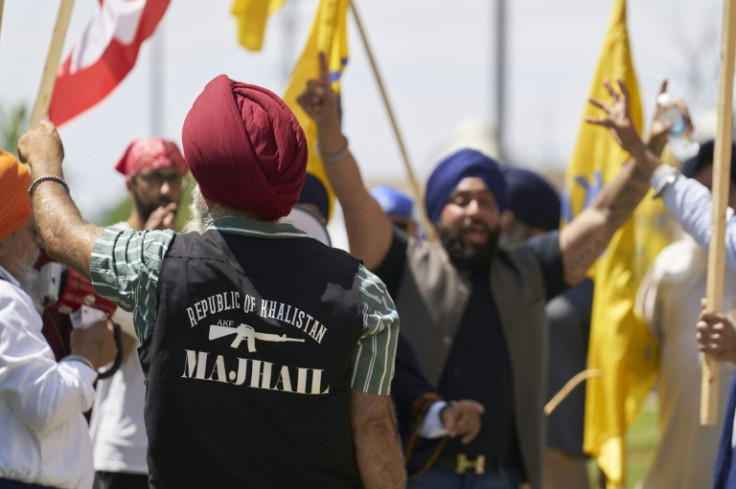Canada Being A Breeding Ground For Khalistan Activism Challenges India's 'Integrity And Sovereignty'

KEY POINTS
- India has repeatedly Ottawa to take action against extreme Khalistan groups that thrive in Canada
- Khalistan activism is not illegal in Canada and is protected under their free speech laws
- Sikh separatist leaders can speak freely, organize for the cause and rally supporters
The eyes of the world have been swaying back and forth between India and Canada ever since relations between the two countries hit rock bottom over the killing of an Indian-born Canadian citizen, Hardeep Singh Nijjar.
The incident has shed light on how a fringe group, part of the very prominent Sikh diaspora in Canada, can make two major democracies of the world go head-to-head with each other and turn friends to foes.
Canada has become somewhat of a breeding ground for Khalistan movement, which is illegal in India but not in the North American country, where the activism is protected under their free speech laws.
Khalistan groups have found ways to "openly advocate for secession from India," and this challenges "India's integrity and sovereignty," Vivek Mishra, a fellow with Observer Research Foundation's Strategic Studies Program, told International Business Times.
Before India-Canada ties were ruptured by Canadian Prime Minister Justin Trudeau's allegations about New Delhi orchestrating Nijjar's murder, the two countries shared a good relationship and were bound together by strong defense and strategic ties.
Another key element that bound the two together was the diaspora, as a large number of Indians have made Canada their home away from their traditional homeland.
The influential Sikh diaspora in Canada is among the most notable connections between the two countries. Roughly 2% of Canada's population is made of Sikhs, making the Western country home to the largest Sikh population outside India.
A small but well-organized part of the Canadian Sikh community is a group that is unfazed in their support for the Khalistan movement -- an anti-India campaign that demands a separate homeland for Sikhs in the state of Punjab.
The Khalistan movement has somewhat lulled in India, but is aggressively backed by certain pockets among the Canadian Sikh community.
Over the years, a number of Indians, who have been branded as criminals and extremists in India, have been given a free pass by Canada.
Nijjar, who reportedly entered Canada with a fraudulent passport in 1997, was an active Khalistani campaigner in the North American nation and a sponsor of violent acts in his home country. He was accused by Indian authorities of being involved in numerous crimes and even a 2007 bombing that killed six people and injured 42 others in his native country.
The June 18 killing of Nijjar, an India-designated terrorist, has now left India and Canada deeply divided.
In the past, New Delhi has asked Ottawa for action against extreme Khalistani groups on multiple occasions, but, in response, received discourses on free speech from the Trudeau government.
Sikh separatist leaders in Canada are allowed to speak freely, organize for the cause and rally supporters to keep the Khalistan movement alive.
Trudeau has said his government does not support the revival of the Khalistan movement in India, but New Delhi still sees the Western country as a hub for the small separatist group to openly incite hate against India.
New Delhi has also been concerned about threats made against Indian diplomats in Canada, and the lack of action by Trudeau's government in this regard.
Last week, a statement issued by India's foreign ministry said, "Threats have particularly targeted Indian diplomats and sections of the Indian community who oppose the anti-India agenda."
Khalistani protests have been held outside Indian missions and consulates in Canada both before and after the escalating row that was triggered by Trudeau's recent allegations.
"While protests are a fundamental aspect of any democratic country, the issue in the Canadian episode is that these protests openly advocate for secession from India. Such a stance is unacceptable to any country that values democracy and sovereignty," Mishra said.
"The implications of the ongoing developments within Canada and their impact on the overall bilateral relationship between India and Canada are grave, given the current circumstances," he added. "To foster stronger ties, Canada must take domestic measures to address certain persistent issues within its borders that challenge India's integrity and sovereignty."
© Copyright IBTimes 2024. All rights reserved.






















